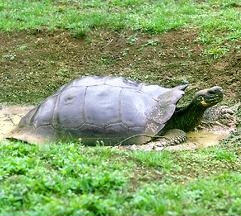Nesoryzomys darwini, also known as Darwin's nesoryzomys or Darwin's Galápagos mouse, is an extinct species of rodent in the genus Nesoryzomys.

Darwin's leaf-eared mouse is a species of rodent in the family Cricetidae.
Actia darwini is a species of parasitic fly in the family Tachinidae.
Darwini, a New Latin adjective that commonly refers to Charles Darwin, may refer to:

Darwin's ringed worm lizard is a species of amphisbaenian in the family Amphisbaenidae. It is endemic to South America.

Darwin's bark spider is an orb-weaver spider that produces the largest known orb webs, ranging from 900 to 28,000 square centimetres, with bridge lines spanning up to 25 metres (82 ft). The spider was discovered in Madagascar in the Andasibe-Mantadia National Park in 2009. Its silk is the toughest biological material ever studied. Its tensile strength is 1.6 GPa. The species was named in honour of the naturalist Charles Darwin on November 24, 2009—precisely 150 years after the publication of The Origin of Species.
Demandasaurus is a genus of rebbachisaurid sauropod dinosaur from early Cretaceous deposits of Spain. Demandasaurus is known from an incomplete but associated skeleton that includes cranial and postcranial remains. It was collected from the Castrillo de la Reina Formation in Burgos Province of Spain. It was first named by Fidel Torcida Fernández-Baldor, José Ignacio Canudo, Pedro Huerta, Diego Montero, Xabier Pereda Suberbiola and Leonardo Salgado in 2011 and the type species is Demandasaurus darwini.

Carabinae is a subfamily of ground beetles in the family Carabidae, containing ten genera and over fourteen hundred described species. It has two tribes, the Cychrini Laporte (1834) and Carabini Latreille (1802). The latter is divided into two subtribes, the Carabina Latreille (1802) and Ceroglossina Vacher de Lapouge (1927).

Ceroglossus is a genus in the beetle family Carabidae. There are about 10 described species in Ceroglossus, found in South America.
Archidela is a genus in the beetle family Cicindelidae. There are at least four described species in Archidela.

Ceroglossus buqueti is a beetle of the family Carabidae.

Ceroglossus chilensis, the Chilean magnificent beetle, is a species of beetle of the family Carabidae.
Clivina darwini is a species of ground beetle in the subfamily Scaritinae. It was described by Sloane in 1916.
Dyschirius darwini is a species of ground beetle in the subfamily Scaritinae. It was described by Kult in 1950.

The Santiago Island giant tortoise, also known commonly as the Santiago giant tortoise and the James Island tortoise, is a subspecies of Galápagos tortoise in the family Testudinidae. The subspecies is endemic to Santiago Island in the Galápagos.
Ceroglossus magellanicus is a species of beetle in the family Carabidae. Eighteen subspecies are currently recognized.
Ceroglossus speciosus is a species of beetle in the family Carabidae.
Ceroglossus suturalis is a species of beetle in the family Carabidae. Five subspecies are currently recognized.
Melizoderes is a genus of treehoppers belonging to the family Melizoderidae. It has 7 described species.







